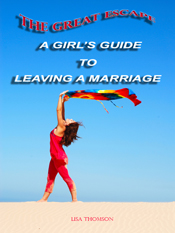Changes in the publishing world such as blogging, self-publishing, and ebooks all make writing a book about your divorce much more possible and feasible than it was even five years ago. That doesn’t mean everyone who experiences divorce ends up writing publicly about it but Lisa Thomson did. Here’s Lisa
I started writing my book because I really felt like when I started my divorce I couldn’t find the kind of resource that I was looking for. I remember thinking, “Surely, Dr. Phil has written a book on divorce,” because I like Dr. Phil and I know that he had written books on family and stuff and I thought, “Oh, I’m sure he’s written something,” but, no. I just couldn’t find very much out there, so that was the impetus of starting the book.

It began with journal writing really and the journal writing was a way for me to express my frustration with the way things were going and express my sadness, my anger, all of those emotions.
Then while I was going to school or taking the classes, I was working part-time at an interior design store, like a home design store. It was like minimum wage, not very good pay, but a really nice lady owned the store and it was my first job back at work. So, I was getting comfortable in the workplace. Sometimes it was really slow and she said, “By all means, you can bring a book and if there’s no one in here and you’ve done the dusting, for goodness sake, don’t sit there and twiddle your thumbs.”
I started bringing my journal in. That’s actually when I had the enlightening moment of thinking, “You know what? I should write a book for women like me who are actually going to initiate this divorce, because I could write down the steps of what you should do before you go, etc. I could write down what I’d been through and what I needed. I can give to other women,” so I started drafting it up when I was actually at work, which sounds funny.
I was journaling before. I journaled all through my marriage. The only scary thing about the journaling was people read your journal. So, I would say that that journal during my marriage was probably quite restricted in a way. I think that I was guarded even in my journal writing. I took a writing course before I had kids at the university and I’ve always loved writing and I’ve always been an avid reader, so it in some ways came naturally to want to write.
The book took a few years and in fact, I stopped writing at one point. I think it was after the divorce appeal, because I was just so discouraged with everything that was going on and I thought, “Oh God, I just don’t have it in me. I just don’t feel—” It’s funny, because I was so close to the end. I got scared. I thought, “Oh no, this is going to be another one of the things you do that you don’t finish.” You know how we all start things and—we all do it, it’s human nature, right?
And I thought, “Oh no, I can’t do that. I can’t.” But I just let it go for probably three months. Then, finally it just sparked like, “You know what? I’m going to finish this. I’m going to finish this.” I wrote the last chapter in like three days, just boom.
I did get it professionally edited and then I also went back and changed a few things. So that’s ongoing. You don’t just finish it and you’re ready to publish, right?
It’s great because I get emails from women who have bought the book and they thank me for writing it and tell me how much it helped them. To me, it just makes everything worthwhile. It’s like, “Oh, thank you.” The feedback is just amazing. That feedback is just really, really special, validating and just reaffirming my purpose of why I did this.
The Divorce Coach Says
Becoming an author may not be in your future but journaling is a valuable, therapeutic practice for getting through and healing from your divorce. It could even lead you to forgiving yourself and your ex.
There are formal writing programs you can join if you feel you need more structure. These programs will give you regular prompts to write about.
You can also journal informally on your own choosing topics around conversations with your STBX, your children or your friends. Focus less on what happened and more on what you’re feeling about those events and trying to understand your emotions.
Lisa touches on an important point – make your journal private. If you’re confident that no-one is reading it or judging you, you’ll be more open and honest and that’s where the healing will come from.
Make keeping a journal a regular practice but be realistic. If you start by saying you’re going to write for an hour or even 30 minutes a day, that probably won’t happen. But ten minutes a day makes it more achievable. And if at first you sit down and find it hard to write for ten minutes, don’t give up. Stick with it. The more often you do this, the easier it will become and the more therapeutic it will be.
P.S. Thinking about blogging? There are some very real dangers in over-sharing. It’s important to think through boundaries on privacy and potential consequences of publicly sharing details of your personal life.
Photo Credit: 2014© www.clipart.com